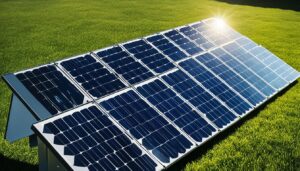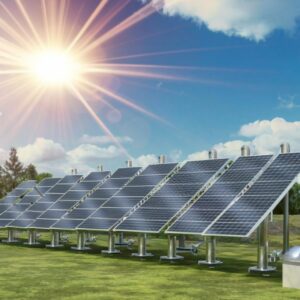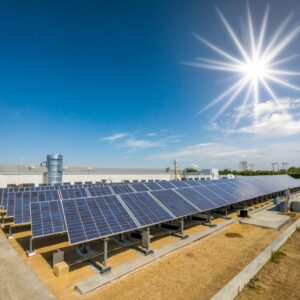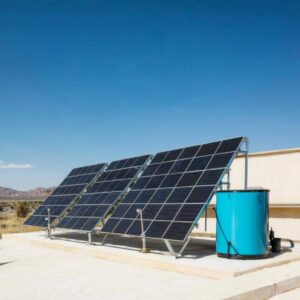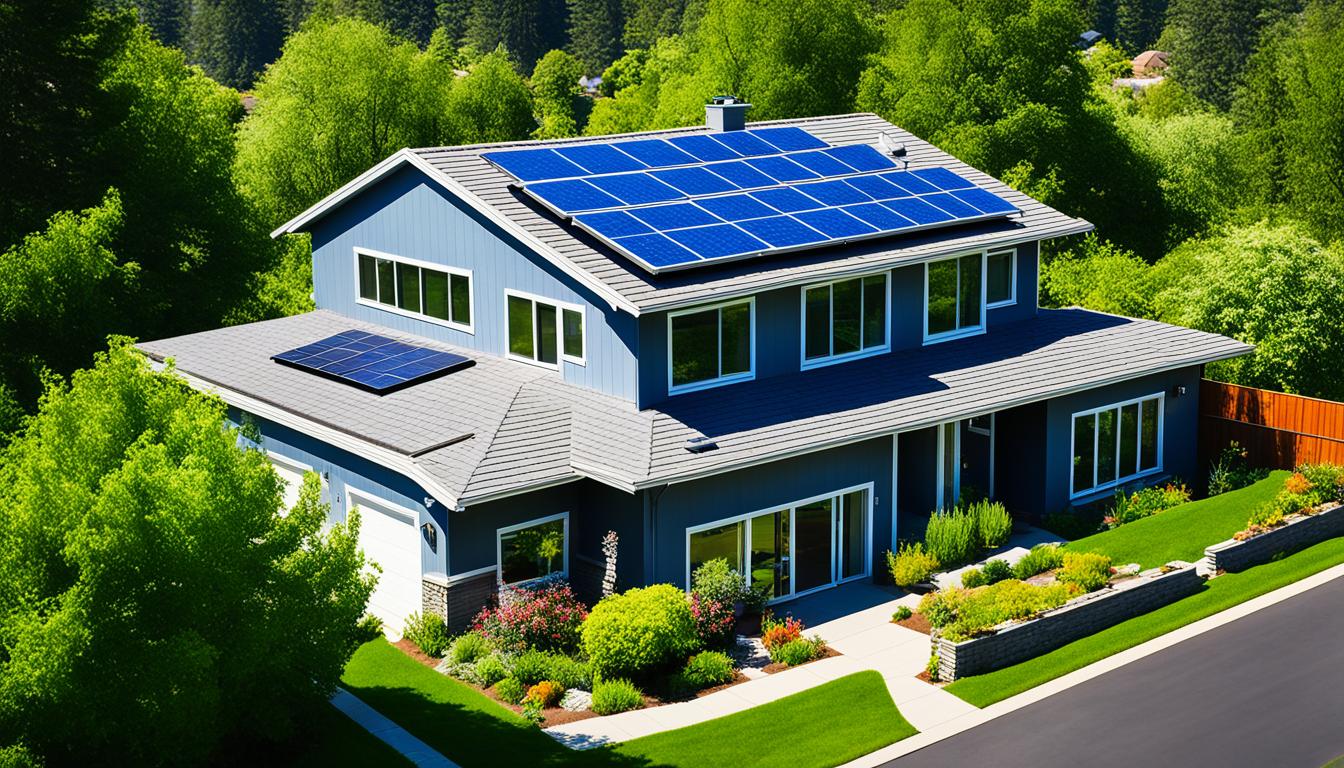
As an industry professional, I am often asked about the benefits of solar panels and how they work. That’s why I’ve put together this beginner’s guide to help homeowners like you understand the process of incorporating solar panels into your home’s energy system. By exploring a real homeowner’s success story, we will delve into the transformative power of solar panels and how they can revolutionize your energy usage.
So, how do solar panels work? Solar panels, also known as photovoltaic (PV) panels, harness the power of sunlight to generate electricity. These panels are composed of interconnected solar cells, which convert sunlight into electrical energy through the process known as the photovoltaic effect. When sunlight hits the solar cells, the semiconducting material within them generates an electrical current by releasing electrons. This direct current (DC) is then converted into alternating current (AC) using an inverter, making it usable for your home’s appliances and devices.
Now, let’s talk about the benefits of solar panels. Incorporating solar panels into your home allows you to tap into the abundant and renewable energy source provided by the sun. By reducing your reliance on traditional grid electricity, you can experience significant energy savings and lower monthly utility bills. Moreover, solar energy is clean and environmentally friendly, helping you reduce your carbon footprint and contribute to a more sustainable future.
Key Takeaways:
- Solar panels convert sunlight into electricity through the photovoltaic effect.
- Using solar panels can lead to energy savings and lower utility bills.
- Solar energy is a clean and sustainable alternative to traditional electricity sources.
- By harnessing solar power, homeowners can reduce their carbon footprint.
- A successful solar panel installation can transform a home’s energy usage.
Understanding the Basics of Solar Panels
Solar panels, also known as photovoltaic (PV) panels, are devices composed of several interconnected solar cells. These cells are responsible for converting sunlight into electricity, a process known as the photovoltaic effect. By absorbing photons from sunlight, the semiconductor material within the solar cells generates a flow of electrons, creating an electrical current. This direct current (DC) is then converted into alternating current (AC) using an inverter, making it suitable for use in residential or commercial buildings.
Photovoltaic cells are the building blocks of solar panels, and they are comprised of layers of semiconductor materials such as silicon. These layers have different electrical charges – the top layer is negatively charged, while the bottom layer is positively charged. When sunlight hits the photovoltaic cells, the photons knock loose the electrons from their atoms, creating an electric voltage. This voltage creates a direct current that can be used to power electrical devices.
“The energy conversion process within solar panels is truly remarkable,” says Dr. Sarah Martinez, a leading expert in renewable energy. “By harnessing the power of the sun, solar panels offer a sustainable solution to meeting our energy needs while reducing our dependence on fossil fuels.”
Installing a solar panel system on a home not only helps to reduce carbon emissions but also provides long-term financial savings. According to recent studies, homeowners can save an average of $1,000 or more annually on their electricity bills by switching to solar energy.
Real Homeowner Success Story: The Johnson Family Goes Solar
To illustrate the transformative impact of solar panels, let’s take a closer look at the Johnson family’s journey toward solar energy adoption.
Background: The Johnson family, based in sunny Southern California, was seeking ways to reduce their rising electricity bills and minimize their environmental footprint. After researching renewable energy options, they decided that solar panels were the right choice for their home.
Decision Process: The family began their journey by consulting with a local solar installation company to assess their energy needs and evaluate their roof’s suitability for solar panels. The company conducted an energy audit, which revealed that the Johnsons could benefit significantly from solar energy, given their high electricity consumption. They were also excited to learn about available incentives and financing options, making solar more accessible.
Installation: After determining that their roof was ideally oriented for solar capture, the Johnson family opted for a 5 kW solar system. They financed the installation through a Power Purchase Agreement (PPA), which allowed them to pay a lower rate for the solar energy generated without the burden of upfront costs. Within a few weeks, the installation was complete, and the family was ready to harness the power of the sun.
Results: Once the solar panels were up and running, the Johnsons saw immediate benefits. Their electricity bills dropped by approximately 70%, saving them around $120 per month. With the help of net metering, they could also sell excess energy back to the grid, earning credits that further offset their utility costs.
The environmental impact was equally gratifying; by switching to solar, the Johnson family reduced their carbon footprint by over 3 tons of CO2 annually, equivalent to planting about 60 trees. The family took pride in their decision to embrace renewable energy, sharing their experience with friends and neighbors and encouraging others to consider solar energy as a viable option.
Advantages of Solar Panels:
- Reduces electricity bills
- Decreases reliance on the grid
- Environmentally friendly
- Long lifespan
| Advantages | Details |
|---|---|
| Reduces electricity bills | Solar panels generate electricity from sunlight, reducing the need to rely on traditional energy sources and lowering monthly utility bills. |
| Decreases reliance on the grid | With solar panels, homeowners can generate their own electricity, reducing dependence on the electrical grid and potential power outages. |
| Environmentally friendly | Solar energy is a renewable and sustainable energy source, leading to a significant reduction in carbon emissions and environmental impact. |
| Long lifespan | Solar panels have a lifespan of 25-30 years, providing a reliable source of clean energy for decades. |
Installing Solar Panels on a Home
Before proceeding with solar panel installation, it is crucial to assess the suitability of your roof. Several factors need to be considered, including the orientation and slope of your roof, shading from nearby structures, and the structural integrity of the roof itself. Evaluating these factors ensures that your roof is suitable for solar panel placement and maximizes energy production.
Once you have determined that your roof is suitable, the installation process involves strategically positioning the solar panels. This involves determining the optimal placement and angle to capture the maximum amount of sunlight throughout the day. To secure the panels, racking systems are used to ensure stability and proper alignment.
In addition to the physical installation process, it is essential to obtain the necessary permits and comply with local regulations. These permits ensure that your solar panel installation meets safety requirements and follows any zoning or building codes set by your municipality. Complying with regulations not only protects your investment but also ensures that your solar panel system is safe and efficient.
Roof Suitability Checklist:
- Assess the roof’s orientation and slope to determine its exposure to sunlight throughout the day.
- Evaluate any potential shading from nearby trees, buildings, or other structures that may obstruct sunlight.
- Check the structural integrity of the roof to ensure it can support the weight of the solar panels.
- Consider the age and condition of the roof, as it may require repairs or replacement before installation.
Permits and Regulations:
When installing solar panels, it is essential to research and understand the specific permits and regulations in your area. This may include:
- Building permits: These ensure that the installation meets safety standards and complies with the local building code.
- Electrical permits: Required for any electrical work involved in the installation, such as connecting the panels to the electrical grid.
- Zoning permits: These ensure that the solar panel installation adheres to any zoning regulations in your area.
- Historical district regulations: If you live in a designated historical district, additional permits or approvals may be necessary to preserve the architectural integrity of the area.
Understanding and complying with these permits and regulations is crucial to ensure a smooth and successful solar panel installation. Failing to obtain the necessary permits or meet the required standards could result in fines or even legal complications.
Harnessing the Benefits of Solar Energy
Incorporating solar panels into a home offers several advantages, including significant energy savings. By generating renewable energy from sunlight, homeowners can reduce their dependence on the traditional electricity grid, leading to lower monthly utility bills.
Additionally, solar energy is a clean and sustainable alternative, reducing carbon emissions and decreasing the overall environmental impact of energy consumption. The long lifespan of solar panels also ensures a reliable source of energy for years to come.
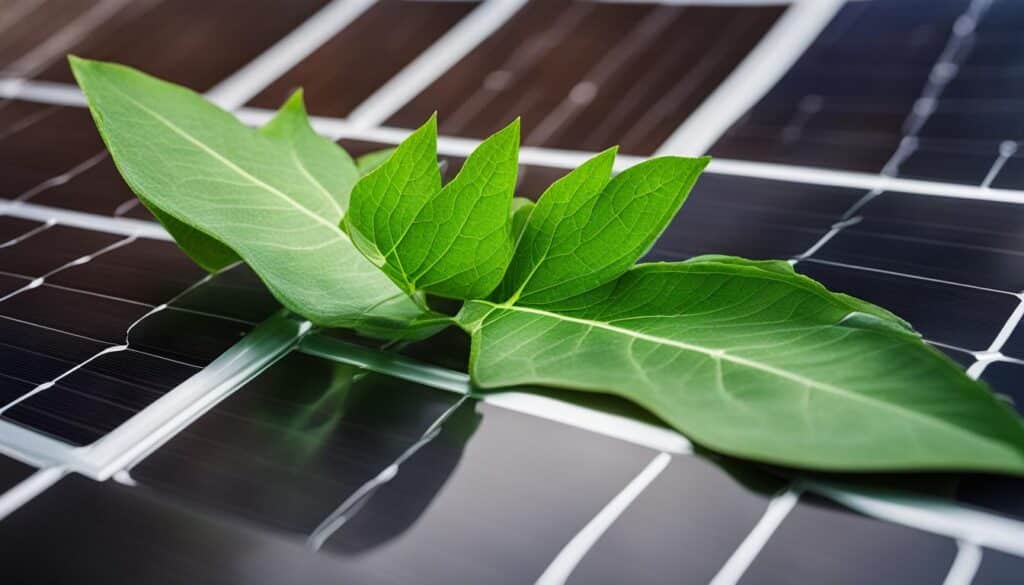
| Advantages | Description |
|---|---|
| Energy savings | By generating renewable energy, homeowners can lower their electricity bills. |
| Environmental impact | Solar energy reduces carbon emissions and promotes a sustainable future. |
Energy Savings
- Generate renewable energy from sunlight.
- Reduce dependence on the traditional electricity grid.
- Lower monthly utility bills.
Environmental Impact
“Solar energy reduces carbon emissions and promotes a sustainable future.”
- Decrease the overall environmental impact of energy consumption.
- Promote sustainability and reduce reliance on fossil fuels.
- Contribute to a cleaner environment for future generations.
Maximizing Solar Panel Efficiency
To ensure optimal performance and maximize energy production, regular maintenance of solar panels is necessary. This includes cleaning the panels, checking for any damages or debris that may obstruct sunlight absorption, and inspecting the inverter and electrical connections.
Ongoing solar panel maintenance helps to prevent inefficiencies and extends the lifespan of the system. By keeping the panels clean and free from dirt, dust, and debris, sunlight can be more effectively absorbed, leading to higher energy production. Regular inspections of the inverter and electrical connections are also essential to identify any potential issues and address them promptly.
It is recommended to clean the panels at least twice a year, or more frequently in areas with high levels of dust, pollen, or dirt accumulation. Using a soft cloth or sponge and mild soap diluted in water is usually sufficient for cleaning. Avoid using abrasive materials or cleaning solutions that may damage the panels.
In addition to regular maintenance, installing monitoring systems can greatly assist in optimizing energy production. These systems provide real-time data on the performance of solar panels, including energy output and any potential malfunctions. By monitoring the system’s performance, homeowners can quickly detect any issues and take necessary actions to mitigate them.
The Importance of Monitoring Systems
Monitoring systems allow homeowners to:
- Track the energy production of their solar panels
- Identify any decreases in performance or efficiency
- Detect faults or malfunctions promptly
- Monitor the overall health of the system
By keeping an eye on the energy production and system performance, homeowners can ensure that their solar panels are operating at their maximum potential. Monitoring systems provide valuable insights that enable informed decision-making when it comes to optimizing energy production.
Ultimately, by maintaining and optimizing the efficiency of solar panels, homeowners can make the most of their investment and achieve the highest possible energy production. This not only maximizes the benefits of solar energy but also contributes to a greener and more sustainable future.
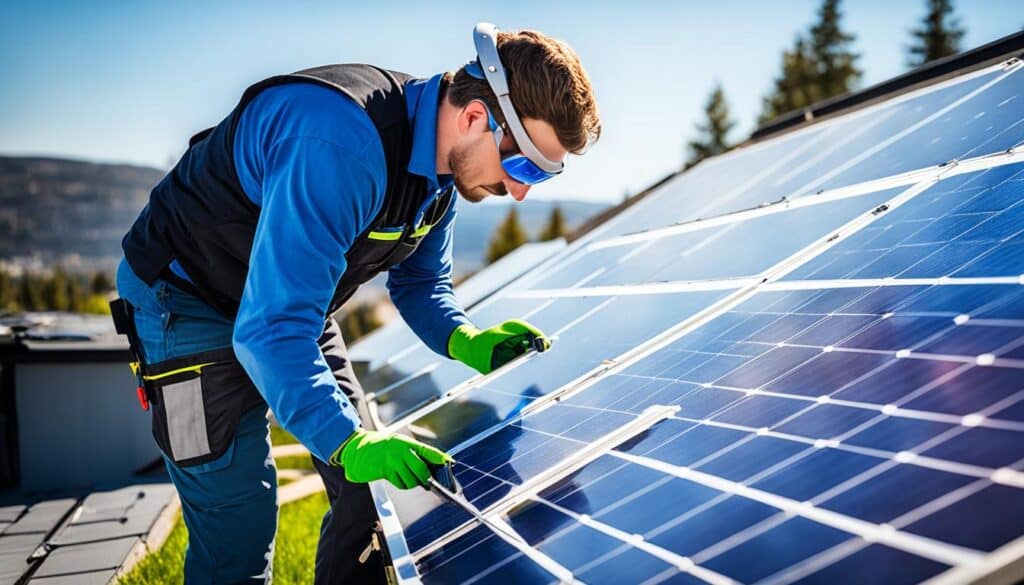
| Maintenance Activities | Frequency |
|---|---|
| Cleaning the panels | At least twice a year |
| Inspecting panels for damages or obstructions | Regularly |
| Inspecting inverter and electrical connections | Regularly |
Financing Options for Solar Panel Installation
While the benefits of solar panels are enticing, the upfront cost of installation can be a significant hurdle for homeowners. Fortunately, there are various financing options available to make solar panel installation more accessible.
Solar Leases
Solar leases provide a popular financing option for homeowners who want to go solar without the burden of purchasing and owning the solar panels outright. With a solar lease, homeowners can enjoy the benefits of solar energy by paying a fixed monthly lease payment to the solar panel provider. This eliminates the need for a large upfront investment and allows homeowners to save on their electricity bills from day one.
Power Purchase Agreements (PPAs)
Power Purchase Agreements (PPAs) offer another alternative for financing solar panel installation. With a PPA, homeowners agree to purchase the electricity produced by the solar panels at a predetermined rate. This rate is often lower than traditional utility rates, resulting in immediate savings on electricity bills. The solar panel provider retains ownership of the panels and is responsible for their maintenance and repair.
Solar Loans
Solar loans are a financing option that allows homeowners to secure a loan specifically for the installation of solar panels. With a solar loan, homeowners can finance the cost of the solar panels and repay the loan over time, typically through monthly installments. The advantage of solar loans is that homeowners become the owners of the solar panels from the beginning, allowing them to benefit from any available tax credits and incentives.
Furthermore, several incentives and tax credits, both at the federal and state levels, can further offset the upfront costs of solar panel installation and provide financial incentives for going solar. These incentives can significantly reduce the overall cost and make solar panel installation a more financially viable investment.
To fully understand the available incentives and tax credits in your area, it is essential to consult with a qualified solar panel provider or reach out to your local government agencies.
| Incentive | Description |
|---|---|
| Federal Investment Tax Credit | A federal tax credit that allows homeowners to deduct a percentage of the installation cost of solar panels from their federal taxes. The percentage varies based on the year of installation. |
| Solar Renewable Energy Credits (SRECs) | A market-based incentive available in some states where homeowners can earn credits for the electricity their solar panels generate. These credits can be sold to utility companies or other buyers. |
| State and Local Rebates | Some states offer cash rebates or grants to homeowners who install solar panels, helping to further offset the upfront costs. |
| Net Metering | A policy that allows homeowners to sell excess electricity generated by their solar panels back to the grid, resulting in reduced electricity bills or credits from the utility company. |
Conclusion
Throughout this beginner’s guide, we have explored the world of solar panels and their immense potential for transforming homes into energy-efficient, sustainable spaces. By understanding the basics of how solar panels work and the installation process, homeowners have gained valuable insights into incorporating this renewable energy source into their properties.
By embracing solar panels, homeowners can tap into a multitude of benefits, including significant energy savings and the reduction of their carbon footprint. The ability to generate clean, renewable energy from sunlight not only lowers monthly electricity bills but also contributes to a greener and more sustainable planet.
With the right information and resources, the journey towards energy sustainability begins. By harnessing the power of solar panels, homeowners can take control of their energy usage, reduce reliance on traditional electricity grids, and contribute to a cleaner and more sustainable future for generations to come.
FAQ
How do solar panels work?
Solar panels, also known as photovoltaic (PV) panels, convert sunlight into electricity through the photovoltaic effect. The solar cells within the panels absorb photons from sunlight, generating a flow of electrons and creating an electrical current. This direct current (DC) is then converted into alternating current (AC) using an inverter for use in homes and buildings.
What factors should I consider when installing solar panels on my home?
Before installation, it is important to assess the suitability of your roof for solar panel placement. Factors to consider include the orientation and slope of the roof, shading from nearby structures, and the overall structural integrity. It is also necessary to obtain any permits and comply with local regulations related to solar panel installation.
What are the benefits of incorporating solar panels into my home?
Incorporating solar panels into your home offers several advantages. It can lead to significant energy savings by reducing your dependence on the traditional electricity grid, resulting in lower monthly utility bills. Solar energy is also a clean and sustainable alternative, reducing carbon emissions and decreasing your overall environmental impact. Additionally, solar panels have a long lifespan, ensuring a reliable source of energy for years to come.
How do I maintain the efficiency of my solar panels?
To ensure optimal performance, regular maintenance is necessary. This includes cleaning the panels, checking for any damages or debris that may obstruct sunlight absorption, and inspecting the inverter and electrical connections. Installing monitoring systems can also help track energy output and identify any issues promptly.
What financing options are available for solar panel installation?
There are various financing options to make solar panel installation more accessible. Options include solar leases, power purchase agreements (PPAs), and solar loans. Additionally, federal and state incentives and tax credits can help offset the upfront costs and provide financial incentives for going solar.
How can I learn more about solar panels and their benefits?
This beginner’s guide provides a comprehensive understanding of solar panels, their installation process, and the benefits they offer. By exploring a real homeowner’s success story, it delves into how solar panels can transform energy usage and lead to energy savings, environmental impact reduction, and increased energy sustainability.

